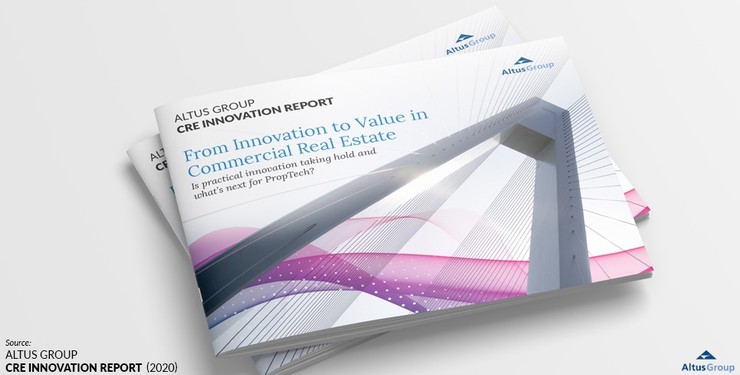Altus Group Report Reveals CRE Industry on the Verge of Significant PropTech Consolidation as Technology Adoption Reaches a Tipping Point

The CRE industry now sits on the cusp of realizing meaningful returns from its technology investments. For the past several years, the acceleration of PropTech has been a major driving force for the modernization of the industry. The rapidly increasing level of PropTech adoption is an indicator that a more complete alignment between emerging technology and the digital transformation in the industry is now occurring.
This innovation shift is not only creating major efficiency gains but also impacting how the industry operates by directly connecting tenants, clients, services and capital. Online platforms, applications and technologies are helping to derive greater value from the abundance of data being generated throughout the industry. In the midst of all of this is the ever-growing prioritization by CRE organizations to drive a data strategy through increased executive sponsorship and involvement.
Automation of processes is also having a profound impact with important implications – from elimination of jobs to shifting job responsibilities and a workforce challenged with new ways of working.
While the industry has greatly benefitted from the expanding innovation agenda and the related explosion of PropTech, a transition is underway from experimentation and early adoption of largely unproven new technology to more of a state of "practical innovation." There is now an overwhelming consensus among CRE leaders of the need for substantial consolidation of PropTech firms industry-wide in order to more effectively deliver the real benefits from rapidly maturing PropTech solutions.
Altus Group, a leading provider of software, data solutions and independent advisory services to the global CRE industry, recently released the latest Altus Group CRE Innovation Report which is based on a survey of 400 CRE executives globally. The report provides an outlook on technology trends and highlights the current digital transformation impacting the global CRE industry.
Recent years have seen the introduction of platform-based marketplaces which connect a broad network of market participants (i.e., buyers and sellers, tenants and landlords, lenders and borrowers, and investors and fund managers) and deliver transactional efficiencies as well as the collection and aggregation of data for the benefit of users.
- Online marketplace platforms are gaining significant traction with 61% of CRE leaders saying they will have a major disruptive impact on the industry.
- Lending platforms have experienced the largest level of adoption to date with 63% of CRE firms having used an online lending marketplace for a recent transaction and 79% planning to increase use in the future.
Data Complexity is Growing but Making Progress through Increased Executive Oversight
Data usability challenges continue to intensify as a result of fragmented data sources, data duplication and heightened complexity of overall data management. CRE executives report increased challenges in many key areas related to data management when compared to five years ago.

The industry is relying heavily on data to drive-decision making but is hindered by disparate data requiring greater amounts of time to manage. Conversely, there exists a growing prioritization by CRE firms to address these challenges through dedicated executive ownership and governance related to overall data strategy.
- Almost half (45%) of CRE teams are spending at least 15% to over 25% of their time managing and organizing data (equivalent to two to three months of the year).
- Eight out of 10 CRE firms now have a Chief Data Officer or equivalent senior executive who oversees their organization’s data strategy and data governance. This compares to Altus Group’s 2016 research where 44% of firms surveyed indicated a lack of executive sponsorship.

PropTech Consolidation is Coming
Over the past five years, the PropTech landscape has rapidly evolved with the emergence of thousands of start-up ventures and new technologies – many yet to be proven and still seeking critical mass adoption. While the PropTech landscape has exploded with a huge proliferation of new, enhanced and competing technologies, CRE executives believe the timeframe for these technologies to start gaining traction and deliver results starts now, with PropTech consolidation a necessary outcome.
- 89% of CRE executives said significant consolidation is needed for PropTech to more effectively deliver on the needs of the CRE industry, with 43% saying it is already underway or will occur within 12 months.
- Areas of PropTech most likely to experience consolidation include property management, property transactions and listing services, and financing and lending firms.
- A large majority of CRE executives (87%) believe global data standards for commercial real estate will eventually be adopted, however, numerous obstacles were identified including a lack of standardized data definitions on a global scale, and privacy and data protection regulations.
- 50% of executives believe 5G wireless will create major disruptive impact on the CRE industry with 81% saying it will support increased adoption and use related to smart city development.
This Week’s Sponsor
Intelligent Buildings begin with Intelligent Wireless Connectivity. RF Connect ensures business-critical applications, BYOD initiatives, occupant connectivity and public-safety communications requirements are met. We do this by designing, deploying, managing and operating wireless communication networks indoors and outdoors. Our scope encompasses technology solutions, capital funding, and turnkey managed services to address the wireless imperative for today and the future.
Read Next
 5/15/2025
5/15/2025
Tech, Talent and Transformation: 2025 Digie Finalists Announced For 27 years, Realcomm has presented the Digie Awards to acknowledge companies, real estate projects, technologies, and individuals that have advanced the commercial real estate industry through the strategic use of technology, automation, and innovation.
 5/15/2025
5/15/2025
Empowering Space Management with Data-Driven Visualization For effective CRE space management, it’s critical to centralize lease data, maximize rental square footage (RSF), improve energy efficiency and reconfigure spaces to meet changing needs.
 5/8/2025
5/8/2025
The AI-Powered Workplace Evolution: Redefining the Business Landscape In today's rapidly evolving business environment, the fusion of Artificial Intelligence (AI) and Workplace Management is revolutionizing the way organizations approach workspace optimization and operational efficiency.
 3/27/2025
3/27/2025
The Convergence of Edge Computing, Cloud, and AI in Building Automation and Smart Buildings In the built environment, we have seen the convergence of Operational Technology (OT) and Information Technology (IT), later expanding to include Workplace Technologies (WP).









%20(1)%20(1)%20(1).png)

